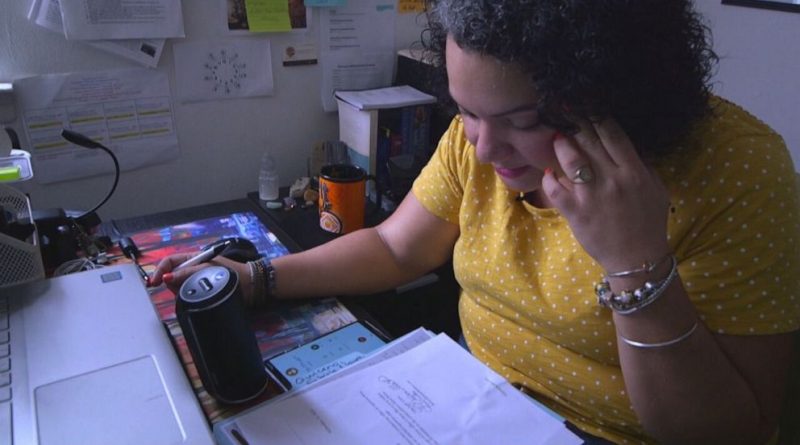Lawyer, single mom finds solace in community aid during COVID-19 unemployment
ABC NewsBy HALEY YAMADA, AUDE SOICHET, and MATT MCGARRY, ABC News
(NEW YORK) — Liceny Espaillat has worked her entire life toward reaching the middle class and, as an immigration lawyer, she always thought she would be beyond the reach of poverty.
But in an unexpected twist, as the coronavirus spread through the United States last year, Espaillat found herself in the middle of a divorce and suddenly without a job after the courts had shut down.
“I went from almost up the ladder — I’m getting there, I’m almost there — and, all of a sudden, this happens, and that’s it, no more money,” Espaillat told “Nightline” five months after she had lost her job. “I had to file for bankruptcy because I had no other choice.”
Watch the full story on “Nightline” TONIGHT at 12:35 a.m. ET on ABC
Since then, Espaillat has been through a harrowing journey navigating the COVID-19 relief system. She struggled to stay afloat when the first round of federal supplement of $600 a week in unemployment benefits ran dry in July and then her unemployment benefits were altogether cancelled due to a system error.
“If this is my life and I’m a lawyer — I have an education, you know, I’m smart, I know where to look for resources — and I’m struggling, what about those other people that didn’t have the luxury to go to college?” said Espaillat. “The ones that didn’t have good parents or the ones that have mental health issues, drug problems, homeless — where are they going?”
Espaillat’s story is all too familiar to the more than 22 million people in the U.S. who have lost their jobs due to COVID-19. Many of them, like Espaillat, were middle-class earners.
“I don’t know if I’m going to get funds before I get evicted,” Espaillat told ”Nightline” in September. “Am I going to find a job in time before everything else becomes a bigger mess? It has been emotionally devastating, physically overwhelming because I’m stressed out.”
President Joe Biden unveiled a $1.9 trillion plan earlier this month that includes a one-time stimulus check of $1,400 for those who are eligible, with bonuses for families with children. If approved by Congress, the COVID-19 aid would be the third round of stimulus payments distributed throughout the country since the start of the pandemic.
Espaillat lives in a two-bedroom apartment in New Jersey with her 4-year-old son, Ethan. She said she juggles school, parenting and a few hours of independent legal work from her bedroom while she looks for a full-time job.
Meanwhile, the food that was once so abundant in her fridge has become scarce.
“Most of the stuff in my fridge has been given to us by either my mom or my best friend. … I’ve been approved [for SNAP], but I have to wait for the card and that can take weeks,” she said in September. “So, that’s why I wanna go to the pantry today.”
Today, four months later, Espaillat is still waiting to receive her SNAP Card, which will give her access to the federal food assistance program formerly known as food stamps. In the meantime, Espaillat has been receiving help from St. James Social Services in downtown Newark, New Jersey.
The private charity relies on donations and grants to help those in need by providing everything from a food pantry and hot meals to free clothing and rent help. With only 11 employees, the charity is trying to meet the growing need in the community.
“I’ve never been to a pantry before to get food, only to donate,” she said.
Forty percent of people who are currently turning to food banks for help never relied on them before, according to an October 2020 study by Feeding America, the country’s largest food relief organization. The nonprofit estimated that with unemployment and poverty on the rise, over 50 million Americans were at risk of food insecurity last year.
“You look at the people in line and it’s like, color, career, class — none of it matters. I’m hungry. My kid’s hungry. It doesn’t matter,” said Espaillat at the food pantry. “It’s humbling, really, to know that that could be me, and today it is me, and yesterday it wasn’t and, hopefully tomorrow, it won’t be again. But today, that’s me.”
“[In] the first three months of the pandemic, we served over 30,000 people,” said Vesta Godwin Clark, who runs St. James Social Services. “Our numbers have quadrupled since the pandemic.”
Clark said that when the pandemic caused shutdowns last March, her staff wasn’t paid.
“We were behind two payrolls because we had no funding coming in, and I think that’s why I love them so much, because they know that somewhere, somehow, that it’s going to work out. But in the meantime, they understand why we do what we do, and it’s not about the money. I always tell [our staff] that the people that we serve, they’re in a position far worse than we are. Far worse.”
For St. James employee Kendall Clark, helping others is a way to repay his own personal debt.
“I was a mess. I was on drugs, I was homeless, I came here and they helped me out… This was in 1992 and I’ve been here ever since,” he said.
Before the pandemic, St. James catered mostly to the elderly and low-income families. The charity says it saw a clear shift from serving a majority of working poor and homeless families to helping middle- and upper-middle-class unemployed families.
“You had some who received unemployment, they received stimulus checks, but then without the stimulus checks, they can’t last on unemployment,” said Vesta Godwin Clark. “Those who are here, we know they truly have a need and no one gets turned away.”
Kevin Woodley, who had worked in finance for 30 years, is one of those pantry newcomers. He comes to St. James every four weeks to collect enough food to keep his family of four going.
“I work over on Wall Street, so you can imagine that when businesses shut down all our revenue went down,” said Woodley. “I’ve never needed help before. But I do need it now and this pantry has been a blessing to me and my family.”
Similarly, Espaillat said that St. James helped her get out of a deep financial hole.
“St. James was able to help me with my back-rent, so now I’m completely at zero — a big change from being behind six months in rent,” she said.
After a devastating year of financial and emotional hardship, Espaillat shared some good news: She recently began a full-time job advocating for people facing evictions, an area of focus she knows from personal experience.
“All of this has taught me that I have to have faith, I have to continue to do the work and ask for help,” said Espaillat. “Anyone out there still struggling, I hope they take comfort in my story and know that it does get better.”
Copyright © 2021, ABC Audio. All rights reserved.

